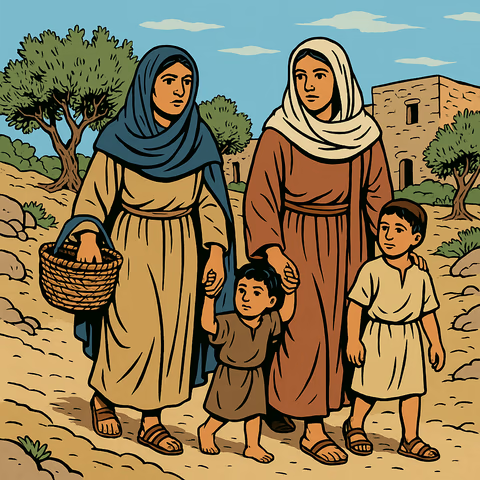
Translating and Traditional Readings
Many of us grew up with Bible translations that sound grand and poetic.
Just think of the King James Version, with its majestic language! But what if that familiar beauty sometimes hides the real meaning, or even introduces confusion?
It’s a tricky balance. Translators in the past often aimed for a certain style, or were working with different understandings than we have today.
Sometimes, readings became ‘traditional’ not because they were the most accurate, but because they sounded good or fit a particular theological viewpoint. This page will explore a few common examples of this.
Our List
- Poetic but Puzzling: When ‘Beauty’ Obscures Meaning
- Matthew 19:14 — ‘Suffer Little Children’ — Allowing or Afflicting?
- 1 Corinthians 13 — ‘Charity’ or Agape Love?
- 1 Thessalonians 4:15 — ‘Prevent’ meaning Precede
- Colossians 3:12 — ‘Bowels of Mercies’ or Heartfelt Compassion?
- Philippians 1:27 / 1 Peter 1:15 — ‘Conversation’ as Conduct
- Matthew 6:25 — ‘Take No Thought’ meaning Don’t Worry
- Acts 10:42 / Hebrews 4:12 — ‘Quick’ meaning Living or Alive
- Genesis 1:29 / Matthew 3:4 — ‘Meat’ as General Food
- Job 39:9-10 — Unicorns in the King James Version?
- The Case of the Missing Name: Jehovah/Yahweh
Poetic but Puzzling: When ‘Beauty’ Obscures Meaning
There’s no denying the power and beauty of certain older Bible translations. They often possess a grandeur unmatched by modern versions. However, what can happen when that poetic beauty is combined with archaic English?
Sometimes translators prioritized a lyrical flow or a particular stylistic choice over clarity. Additionally, over centuries, the meanings of words change, or even fall out of common use entirely. So a phrase that was once clear and impactful is now obscure, or even outright misleading.
For example, Psalm 4:2 from the King James Version asks:
‘O ye sons of men, how long will ye turn my glory into shame? how long will ye love vanity, and seek after leasing?’
The word ‘leasing’ sounds wonderfully archaic, doesn’t it? But how many of us instinctively know it means ‘lying’ or ‘falsehood’? In this case, the poetic flourish hides a very direct and serious accusation!
Our translation says:
‘[So hear me], O sons of men;
How long will you stay so hardhearted,
And why do you love what’s foolish,
Always searching for things that aren’t true?
Our translation tries to capture the spirit and intent of the original texts while using language that everyone can understand. We want you to grasp the meaning without needing a dictionary for every other word, ensuring that the message isn’t lost in translation.
Yes, we often try to recreate poetic language, but we won’t prioritize it over clarity and accuracy.
Our Editor comments:
I’ve heard many people express their love for the archaic language of the King James Version. And it’s true! Many of them sound incredible!
The problem is that I also hear people quote ‘beautiful’ passages that are just ordinary, everyday phrases, that were never meant to be poetic at all. They will also express appreciation for certain lines from the Psalms that they believe are saying something very different from what they actually say.
I’ve seen these on social media posts, t-shirts, and mugs. And they’re nonsense.
Beauty is one thing, but twisting Bible texts to say something else, just because it sounds ‘beautiful’, is grossly dishonest. Also, it’s often telling non-Bible readers that the Bible says such-and-such, when it doesn’t. Sometimes it gives non-Christians the impression that the Bible is filled with soppy rubbish.
Of course, some people understand what the older wording means perfectly, and enjoy it very much. However, it would be helpful if they could ensure that they are not misleading others while doing so.
- Read more: Neutral Terms
Matthew 19:14 — ‘Suffer Little Children’ — Allowing or Afflicting?
In the King James Version, it says:
‘But Jesus said, Suffer little children, and forbid them not, to come unto me: for of such is the kingdom of heaven.’
When Jesus says, ‘Suffer little children’, does that sound like he wants to inflict pain or hardship on them? In modern English, ‘suffer’ often implies enduring pain or distress, but not in 17th-century English!
In the 17th century, ‘suffer’ frequently meant ‘to allow’ or ‘to permit’.
So, Jesus was actually telling his disciples to allow or let the children come to him, not to harm them in any way. It was nothing more than a normal, everyday instruction, with no greater meaning than saying, ‘leave them alone’.
Our translation says:
However, Jesus told them:
‘Leave the children alone and don’t stop them from coming to me, because the Kingdom of [God] is for people just like this!’
Our Editor comments:
This one really irks me. Many journalists quote this KJV verse, thinking they’re saying something really poetic and profound when reporting on various Church sex abuse scandals.
In reality, they’re telling everyone that they won’t even do the most basic fact-checking. That’s extremely irritating when reporting on such serious matters (what other incompetent mistakes have they made?) — never mind the fact that they’re also distorting scripture.
Others quote this KJV verse like it’s some kind of poetic statement about suffering. It’s really not. At all.
1 Corinthians 13:13 — ‘Charity’ or Agape Love?
In the King James Version, it says:
‘And now abideth faith, hope, charity, these three; but the greatest of these is charity.’
When you read 1 Corinthians 13 in older translations, you’ll see ‘charity’ used repeatedly? In modern English, ‘charity’ typically means donating money or goods to a charitable organization. This sense significantly narrows the powerful message Paul was conveying.
The Greek word here is ἀγάπη (agapē), which refers to a self-sacrificing, principled form of love, not just giving donations. By using ‘charity’, older translations leave out the wider meaning of the word.
Our translation says:
‘And at that time, only these three things will remain: faith, hope, and love. And the greatest of them is love.’
1 Thessalonians 4:15 — ‘Prevent’ meaning Precede
In the King James Version, it says:
‘For this we say unto you by the word of the Lord, that we which are alive and remain unto the coming of the Lord shall not prevent them which are asleep.’
Have you ever wondered why it says that those alive would not ‘prevent’ those who’ve already died? In modern English, ‘prevent’ means to stop something. But in the King James era, the word had a very different sense.
Back then, ‘prevent’ meant to ‘precede’ or to ‘go before’. So, when the text says those alive will not ‘prevent’ those asleep, it’s not saying they will stop them, but rather that they won’t go before them in the resurrection.
It’s about sequence, not hindrance!
Our translation says:
‘Understand that what we’re saying to you is the word of the Lord… That those who are still living at the appearance of the Lord will definitely not go ahead of those who’ve fallen asleep.’
Colossians 3:12 — ‘Bowels of Mercies’ or Heartfelt Compassion?
In the King James Version, it says:
‘Put on therefore, as the elect of God, holy and beloved, bowels of mercies, kindness, humbleness of mind, meekness, longsuffering;’
The phrase ‘bowels of mercies’ in Colossians 3:12 sounds very strange to modern ears! We typically associate ‘bowels’ with intestines, which doesn’t exactly conjure up warm feelings of compassion.
However, in ancient times, the ‘bowels’ were considered the seat of deep emotions and affections. So, ‘bowels of mercies’ was an idiom meaning heartfelt compassion or deep tenderness. A literal translation, while technically correct, simply doesn’t mean the same thing in modern English.
Our translation says:
‘Then, as God’s chosen people who are holy and loved, you must put on the caring traits of empathy, kindness, humility, meekness, and patience.’
Philippians 1:27 / 1 Peter 1:15 — ‘Conversation’ as Conduct
In the King James Version, it says:
‘Only let your conversation be as it becometh the gospel of Christ…’
When you see the word ‘conversation’ in older Bible translations, do you think it refers to talking or chatting? That’s not what it meant at all when the King James Version was written!
In the 17th century, ‘conversation’ broadly referred to one’s conduct, manner of life, or general behavior. So, when Paul encourages believers to watch their ‘conversation’, he’s talking about their lifestyle and actions, not just their speech. This distinction dramatically changes the meaning!
Our translation says:
‘Just behave in a way that’s worthy of the good news about the Anointed One…’
And while the King James Version of 1 Peter says:
‘But as he which hath called you is holy, so be ye holy in all manner of conversation;’
Our translation says:
‘Rather, like the Holy One who called you, become holy in all of your ways.’
Matthew 6:25 — ‘Take No Thought’ meaning Don’t Worry
In the King James Version, it says:
‘Therefore I say unto you, Take no thought for your life, what ye shall eat, or what ye shall drink; nor yet for your body, what ye shall put on.’
Jesus tells his disciples to ‘take no thought’ for their life. This phrase is misleading in modern English. We usually interpret ‘take no thought’ as ‘don’t think about it at all’ or ‘don’t plan for it’.
What Jesus was actually saying was ‘don’t worry’ or ‘don’t be anxious’.
In archaic English, ‘take thought’ often meant to become anxious or distressed about something. This isn’t a command to be irresponsible, but rather an instruction to trust God and avoid anxious worry about material needs.
Our translation says:
‘I’m also telling you that you shouldn’t worry about your lives, or what you’ll eat,
or what you’ll drinkor your bodies and what you’ll wear.’
Acts 10:42 / Hebrews 4:12 — ‘Quick’ meaning Living or Alive
In the King James Version, it says:
‘And he commanded us to preach unto the people, and to testify that it is he which was ordained of God to be the Judge of quick and dead.’
In modern English, ‘quick’ almost exclusively means ‘fast’.
However, in earlier English, ‘quick’ meant ‘living’ or ‘alive’. So, when you read that God judges the ‘quick’ and the dead, it simply means the living and the dead, that’s all. And God’s word being ‘quick’ means it is living and active, not speedy.
Our translation says:
‘Then he ordered us to preach to the people and to testify that he’s the one who was chosen by The God to judge the living and the dead’
And the King James Version of Hebrews says:
‘For the word of God is quick, and powerful, and sharper than any twoedged sword…’
Our translation says:
‘Understand that God’s word is living – it’s at work, and it’s sharper than any double-edged sword!’
Genesis 1:29 / Matthew 3:4 — ‘Meat’ as General Food
In the King James Version, Genesis says:
‘And God said, Behold, I have given you every herb bearing seed… to you it shall be for meat.’
When you read that Adam and Eve were given every herb for ‘meat’ in Genesis , or that John the Baptist’s ‘meat’ was locusts and wild honey, what do you think it means?
In older English, ‘meat’ was a general term for any kind of food or sustenance, not just animal flesh. This is why the King James Version could describe the plant-based diet of Adam and Eve as providing ‘meat’.
Our translation says:
Then The God said:
‘Look! I’ve given you all the seed-bearing crops…
[That you] can plant for your food.
And the King James Version of Matthew says:
‘And the same John had his raiment of camel’s hair… and his meat was locusts and wild honey.’
Our translation says:
‘John wore clothes made of camel’s hair, … and what he ate was locusts and wild honey.’
Job 39:9-10 — Unicorns in the King James Version?
In the King James Version, it says:
‘Will the unicorn be willing to serve thee, or abide by thy crib? Canst thou bind the unicorn with his band in the furrow? or will he harrow the valleys after thee?’
One of the most famously strange translations in the King James Version is the mention of the ‘unicorn’ in Job. This immediately brings to mind the mythical creature with a single, spiraling horn. Was the biblical writer truly talking about a mythical beast?
No.
The Hebrew word translated here is רְאֵם (reʼem), which almost certainly refers to a powerful, single-horned wild ox, likely the now-extinct aurochs, or possibly a single-horned rhinoceros.
There are real, powerful animals, known for their strength and untamable nature. The King James translators chose ‘unicorn’ because they had never seen a single-horned animal and no idea what it was supposed to be. So, with no English word to use, they sensibly created a new word for it. To do this, they consulted the word used in the Greek Septuagint’s translation of the verse, which calls it a ‘one-horned’.
Later, artists imagined what this single-horned animal might look like, so they stuck a horn on a horse, and the unicorn was born!
Our translation says:
‘Can you make the rhinoceros do what you say?
Can you force him to sleep in your barn?
Can you tie him with straps and put on a yoke,
Then use him to plow up your fields?’
The Case of the Missing Name: Jehovah/Yahweh
We cover the replacement of God’s personal name (YHWH) with circumlocutions in other articles.
However, here’s a classic example from the King James Version:
‘The LORD said unto my Lord, Sit thou at my right hand, until I make thine enemies thy footstool.’
Our translation says:
‘[Jehovah] said this to my lord:
‘Sit here at My right hand
‘Til I set your enemies as a stool for your feet.’
Since ‘Lord’ is used twice, it’s unclear who is talking to whom. The translators put the first in capital letters, as a hint that it replaces YHWH, but most readers don’t know that (and most modern translations don’t even do this).
To learn more, see:
Translating Bias
 Translating and Authority of the Church
Translating and Authority of the Church Translating and the Trinity Doctrine
Translating and the Trinity Doctrine Translating and Afterlife Doctrine
Translating and Afterlife Doctrine Translating and Texts About Women
Translating and Texts About Women Translating and End-Times Doctrines
Translating and End-Times Doctrines Translating and Traditional Readings
Translating and Traditional Readings
Also see our Articles index and our About section.